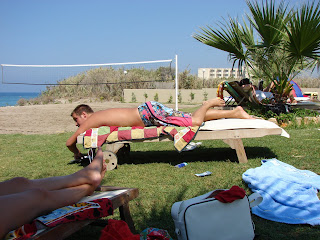woensdag 1 juni 2011
Objectivity does not exist
maandag 30 mei 2011
Wikipedia-based journalism: The painful future...

There are a large number of changes since the rise of the online and free encyclopedia Wikipedia. First of all, this encyclopedia is more up-to-date than the tangible version of an encyclopedia. When a soccer player moves to another team, Wikipedia will adapt it immediately. A break up between David Beckham and his wife Victoria? It will be edited in an hour on Wikipedia.
The principle of a wiki is quite simple: somebody posts a description of something or somebody on a website and everybody is free to edit the content of it. Wikipedia works on the same way: a person creates a text about somebody (say: the biography of world’s best soccer player Lionel Messi) and everybody who knows more about him is able to add that information.
However, there is a limit in the adaptations on Wikipedia. An insane person who thinks that it will be funny to adapt the contents of topics like World War II, the 2011 tsunami in
What about journalism nowadays? Did the rise of Wikipedia affect the current world of journalists? Normally, everybody will say: no. A journalist doesn’t use Wikipedia as a source of information, at most to check some general facts.
There is an exception, people! Just my own employer, Algemeen Dagblad (a Dutch newspaper and I am working there as a freelance journalist) uses Wikipedia as a source of information. My favorite soccer team in the world, FC Barcelona, has a unique offense: the amazing Lionel Messi, Spanish striker David Villa and rooky Pedro Rodríguez. In funny circumstances, me and a friend edited the content of Pedro on Wikipedia. I made myself the discoverer of Pedro on the Dutch version of Wikipedia and advised FC Barcelona in 2004 to transfer him to
I am proud that Algemeen Dagblad makes me part of the history of the ‘Blaugranas’, but I am also ashamed. Where are we going to in the current world of journalism? Please, please, please: could somebody stop this way of ‘copy-paste’ journalism and make journalism qualitative again?
dinsdag 24 mei 2011
Is he dead?
There will be nobody in the whole, wide world who missed the news about the dead of American's public enemy number one: Osama bin Laden. The terrorist was killed in a firefight in Abbottabad (Pakistan), after a militair operation of the Americans. There were rumors, immediately after the dead of Bin Laden: is the killed man really Osama bin Laden? Is it not a way of winning popularity for Barack Obama? How long did Bin Laden stayed in Abbottabad? And why are there no pictures of his dead body?
Although the Americans killed their greatest enemy, the communication process was undersized. The only people who are quite sure about the dead of Al Queada's leader are the members of the special force team and Obama himself (see picture above), who followed the whole operation on a big television screen. What about the rest of the world, Barack? Do we have to do it with your promise and some facts like: 'Osama used his fifth wife as a shield', 'We practiced the operation in Afghanistan in a copied house' and most sensational: 'We gave Bin Laden a burial at sea'.
We are living in a digital world nowadays and almost everything in this world is findable. If you need an email account of a doctor in South-Africa, you need to know the favourite sport of a woman in Iraq or the idol of your neighbour: you can almost find everything on the world wide web. People wants to know a large number of facts and more important: they want evidence for these facts. A shooting in a Dutch shopping-centre? Photo's please. The man without a face is operated? We want to see his new face. A crashed plane? Pictures, before we believe this horrible fact.
Therefore, Barack, a call from mankind: would you please come with more evidence about the dead of Osama bin Laden? We need a small picture or otherwise a DNA proof. Or... am I too curious and suspicious?
maandag 9 mei 2011
Our Vlog!
donderdag 28 april 2011
vrijdag 22 april 2011
The sun is shining for Facebook

Imagine the following situation: you are studying a boring paper, while sitting on a table in a hot room and the temperature outside is around 30 degrees. It is clear that everyone wants to be outside: the pool, beach or park are better options than reading that boring paper. However, you have to do it, otherwise you will fail the exam. During studying, you take a quick look at your Facebook profile and what do you see? More messages and updates than usual!